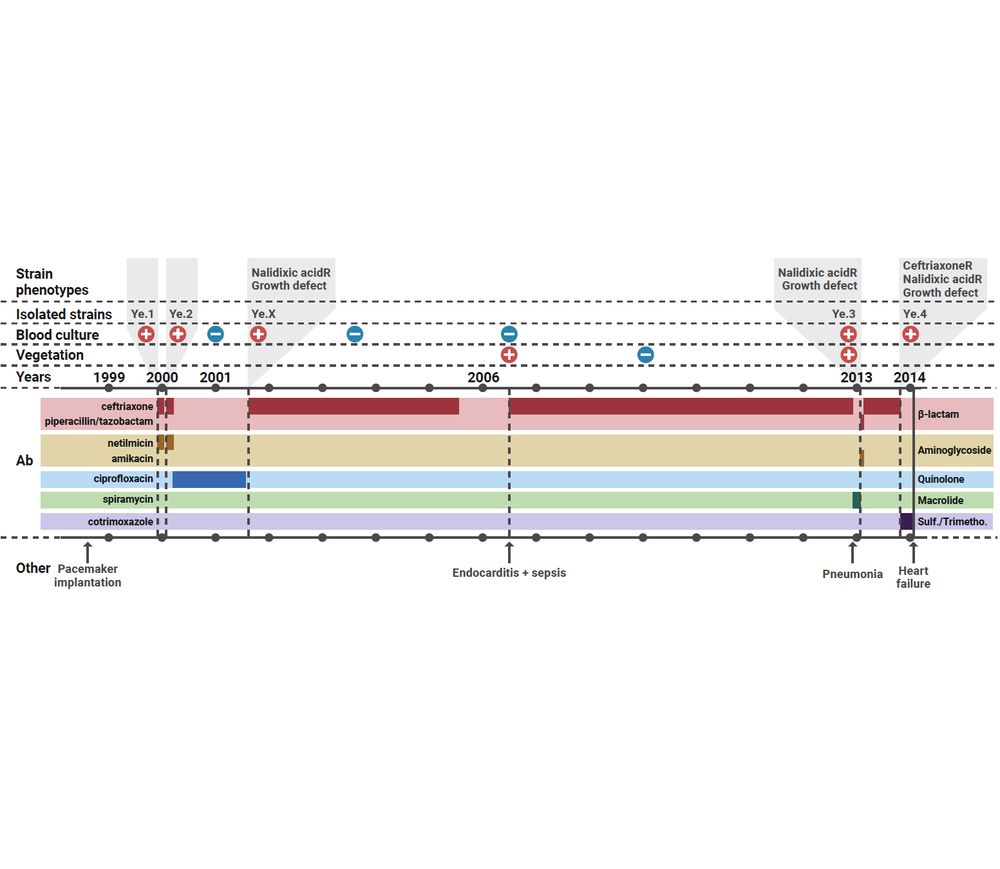Postdoctoral researcher | ImVA-HB / IDMIT @cea.fr | @yersiniaunit.bsky.social @pasteur.fr.
🚫 We also identified positive selection signals:
- a truncation in the phosphate transporter PitA which probably impairs its activity
- an amino acid substitution interfering with the active site and diminishing the catalytic activity of the acyl-CoA thioesterase II TesB

🚫 We also identified positive selection signals:
- a truncation in the phosphate transporter PitA which probably impairs its activity
- an amino acid substitution interfering with the active site and diminishing the catalytic activity of the acyl-CoA thioesterase II TesB
🍔 Omics analysis also unraveled:
- a progressive genome reduction
- metabolic changes in amino acid and carbon utilization
- a disturbed stringent response
which could contribute to the observed slower growth and antibiotic tolerance preceding resistance.

🍔 Omics analysis also unraveled:
- a progressive genome reduction
- metabolic changes in amino acid and carbon utilization
- a disturbed stringent response
which could contribute to the observed slower growth and antibiotic tolerance preceding resistance.
🧫 Ye.1 to Ye.4 belong to the Ye genotype 4 (bioserotype 4/O:3) and a form a unique clade separated from other Ye strains, strongly suggesting that the patient suffered from a chronic infection due to a unique evolving Ye 4/O:3 strain.

🧫 Ye.1 to Ye.4 belong to the Ye genotype 4 (bioserotype 4/O:3) and a form a unique clade separated from other Ye strains, strongly suggesting that the patient suffered from a chronic infection due to a unique evolving Ye 4/O:3 strain.
🏥 Thanks to the National Reference Center for Plague and other Yersiniosis in @pasteur.fr, we collected 4 clinical isolates — Ye.1 to Ye.4, which evolved antibiotics tolerance and resistance — from a rare chronic infection in an elderly patient from @chrudetours.bsky.social.

🏥 Thanks to the National Reference Center for Plague and other Yersiniosis in @pasteur.fr, we collected 4 clinical isolates — Ye.1 to Ye.4, which evolved antibiotics tolerance and resistance — from a rare chronic infection in an elderly patient from @chrudetours.bsky.social.
Pla depletion may reflect adaptive evolution during declining host populations throughout a pandemic, while full virulence remains crucial for long-term survival in sylvatic reservoirs between pandemics.

Pla depletion may reflect adaptive evolution during declining host populations throughout a pandemic, while full virulence remains crucial for long-term survival in sylvatic reservoirs between pandemics.
🧪 Pla enzyme activity scales with pla gene dosage. pla-depleted strains remain virulent but cause slightly lower mortality and delayed death in bubonic plague.

🧪 Pla enzyme activity scales with pla gene dosage. pla-depleted strains remain virulent but cause slightly lower mortality and delayed death in bubonic plague.
🧬 pla depletion is mediated by integration of the high-copy-number pPCP1 plasmid into low-copy replicons. This is combined with pla excision from the high-copy-number pPCP1 possibly via Xer recombination sites.

🧬 pla depletion is mediated by integration of the high-copy-number pPCP1 plasmid into low-copy replicons. This is combined with pla excision from the high-copy-number pPCP1 possibly via Xer recombination sites.
🌍 pla copy number reduction occured during the 1st, the 2nd but also during the 3rd pandemic.

🌍 pla copy number reduction occured during the 1st, the 2nd but also during the 3rd pandemic.

